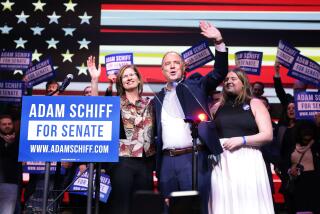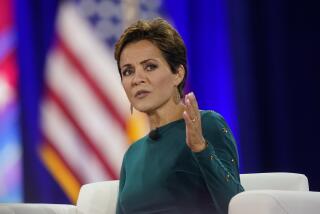Zschau Resorts to Big Lie in TV Ads, Cranston Charges
- Share via
WASHINGTON — Democratic Sen. Alan Cranston on Wednesday accused Republican challenger Ed Zschau of lying in television commercials about Cranston’s voting record and likened Zschau’s tactics to the classic smear campaign waged by Richard M. Nixon to defeat former California Rep. Helen Gahagan Douglas in a 1950 U.S. Senate race.
Lashing out in the strongest terms of the campaign against Zschau, a moderate congressman from Los Altos, Cranston said that his opponent resorted to “the technique of the big lie” in a 3-week-old advertising drive that accused the senator of voting against major drug control and anti-terrorist legislation.
“That’s what he (Nixon) did, and that’s what is occurring here,” Cranston alleged. “I don’t think he’s qualified to be a senator.”
The attack was consistent with Cranston’s strategy of maintaining the offensive against Zschau, whose voting record has been the subject of frequent Cranston ridicule.
Zschau, campaigning in Orange County on Wednesday with Vice President George Bush, said that Cranston should agree to discuss the smear charge and other issues in one-on-one television debates.
“We researched those ads before we put them on, and if he has some problem and wants to clarify it, all he has to do is to agree to the League of Women Voters’ proposal for televised debates. We can discuss these and other issues,” Zschau said.
(Cranston still has not accepted the league’s proposal for two debates with Zschau and one debate that would include the three minor party candidates.)
Zschau campaign spokesman Jim LeMunyon contended that Cranston’s increasingly harsh language proves that the attacks are having an effect on the incumbent’s credibility and popularity with voters.
“When he doesn’t have a response, when we’ve got him on the run, all he can do is call us names,” LeMunyon said. “He’s responding to our agenda now.”
LeMunyon claimed that private campaign polls indicated that the commercials, which have been running statewide for three weeks at a cost to the Zschau camp of $1.5 million, had nearly halved Cranston’s once sizable lead over his challenger.
A Los Angeles Times poll conducted early this month showed Cranston leading Zschau by a 39%-24% margin, with 37% of those questioned indicating that they were undecided. LeMunyon claimed that the Zschau poll showed the Cranston lead had dipped to 8%.
The Zschau commercials said that Cranston, during his 18 years in the Senate, had either opposed most bills designed to deal with terrorism and drug abuse or failed to vote on them. The Zschau campaign replaced those ads this week with another series attacking Cranston’s opposition to the death penalty.
Cranston contended that his voting record had been distorted and misrepresented by Zschau commercials that were based on similar tactics. “They play on public fear of terrorism, drug abuse and crime for cynical, political ends,” Cranston said.
Cranston likened the Zschau tactics to those used in the McCarthy era campaign in which Nixon exploited the Red scare to defeat Douglas. Nixon openly implied that she was a communist sympathizer by calling her “pink” and distributing flyers of that color, which tied her voting record to another well-known lawmaker widely considered to have had such political leanings.
Detailed Response
In a detailed response to Zschau’s charges, Cranston listed many drug- and terrorism-related bills that he had either voted for or co-sponsored. And he attacked Zschau for failing to introduce any such legislation during his two House terms.
Cranston said he has not ruled out a debate with Zschau but insisted that it would be difficult to adequately refute the complex allegations leveled by the challenger in the limited time alloted in a debate format or in television commercials of his own.
“You can’t deal too effectively with a series of lies like these with a television response,” Cranston said.
More to Read
Get the L.A. Times Politics newsletter
Deeply reported insights into legislation, politics and policy from Sacramento, Washington and beyond. In your inbox three times per week.
You may occasionally receive promotional content from the Los Angeles Times.










